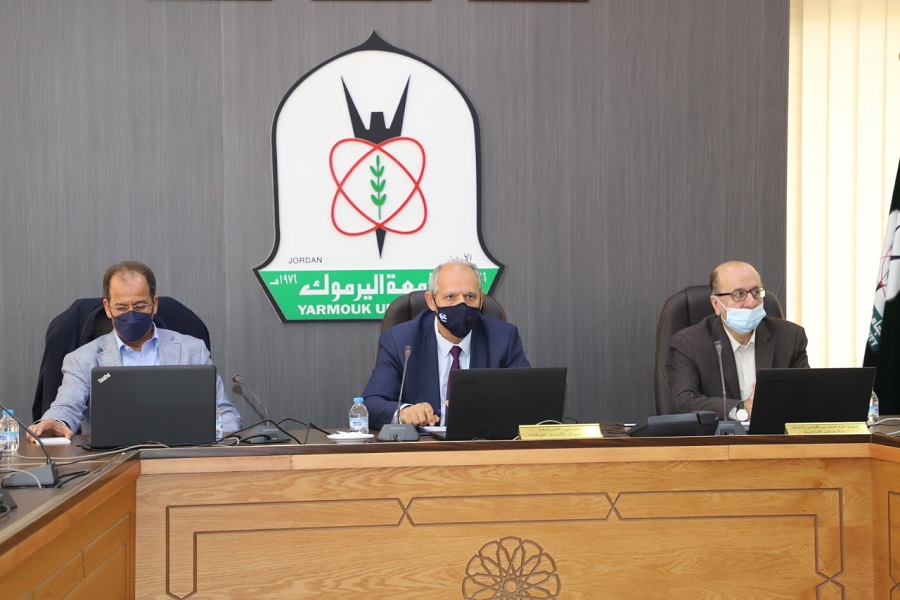
Within the celebrations of Yarmouk University of the centenary of the Jordanian state, the President of the University, Dr. Nabil Al-Hilat, sponsored the symposium on "Jordanian Media Discourse at the Beginning of the Second Centenary", which was organized by the College of Mass Communication by purifying visual communication from a distance, in which the former Minister of State for Media Affairs Samih Al-Maaitah and the Director The previous year for Jordan News Agency - Petra.
Al-Hilat said that organizing this symposium comes within the series of cultural and intellectual activities and events that Yarmouk University is implementing within its celebrations on the occasion of the glorious country's centenary, based on its role in deepening the comprehensive national message and enhancing its march.
He added that the Jordanian media, and throughout the course of the state, was known for its commitment, responsibility, and defense of the image and message of the Jordanian state, and certainly there are technological and communication changes that have affected, directly or indirectly, the media in general.
Al-Hilat stressed that in the midst of these challenges, we were at Yarmouk University through the College of Media and in partnership with official and non-official media institutions, we are looking forward to identifying these challenges and presenting proposals that would keep the media an important tool in the service of the people and the state's policy.
Al-Shboul stressed that the media succeeds insofar as it reflects the state of society, and is free to the extent that it reflects the general policies of the state, indicating that in order for any media to succeed in its path and mission, it must first define its identity and then know its audience.
He added that the race for excitement should not be at the expense of the identity of the media outlet, given that the biggest loser in the decline of the media is society, indicating that the media receives daily defeats in front of social media, and that solutions begin with legislation and administration.
Al-Shboul believes that the Jordanian professional media is entering the second centenary and is facing three problems that it must address, which are false news, hate speech and violation of privacy, and therefore there is a difficult equation for the media to confront, which is social communication and the angry public.
He stressed the need for media outlets and media professionals to adhere to legislation and pressure to develop it for the better, as a journalist is a licensed and qualified person to address the public, while social media users are not qualified.
On the other hand, Ma'aytah believes that the delay in the emergence of newspapers in Jordan from the countries of the region was due to the weakness of education and culture and Ottoman neglect. Al-Kubra, 5 issues of which were published, 4 of them in Ma'an, and only one in Amman.
Al-Ma`aytah pointed out that the newspapers carried issues of Jordan and the nation, and were an expression of the political situation, although their technical level was not as it should be due to the weakness of their infrastructure, and that any newspapers reflect the conditions of society and the state, as well as the way individuals think, as they read through them. How does the state manage people's affairs, and what are the areas of trust between these people and their state.
He stressed: The state must restore respect to the media, and give it the leadership to be its weapon in building and renaissance and not to fight the convictions of the people, but rather to support its path and strengthen their conviction sincerely about what is being said, and that any state should not turn its back on the media and leave it suffering, whether this is the media Private or public, stressing the need to pay attention to the content, and what do we offer the public?
He pointed out that the future requires us to restructure the role and content of journalism, qualify journalists for paper journalism, and enhance credibility, because there is an unfair injection of its credibility.
In the conclusion of the symposium, the Dean of the College of Mass Communication, Dr. Khalaf Al-Tahat, stressed that the College of Media, based on the strategic plan of Yarmouk University, and its duties and responsibilities, will not hesitate to organize such seminars that are related to the media and the course of the state.
As we celebrate the centenary of the Jordanian state, he added, this is an opportunity to find out, evaluate and review our media experience, to launch a new vision and aspirations that deepen the process and enhance successes in various fields.
The seminar was attended by the Vice President for Academic Affairs, Dr. Muwaffaq Al-Amoush, and the Vice President for Administrative Affairs, Dr. Riyad Al-Momani, while Dr. Amjad Al-Qadi from the Department of Public Relations and Media attended the seminar, as well as a number of faculty and administrative staff and students of the Faculty of Information.
